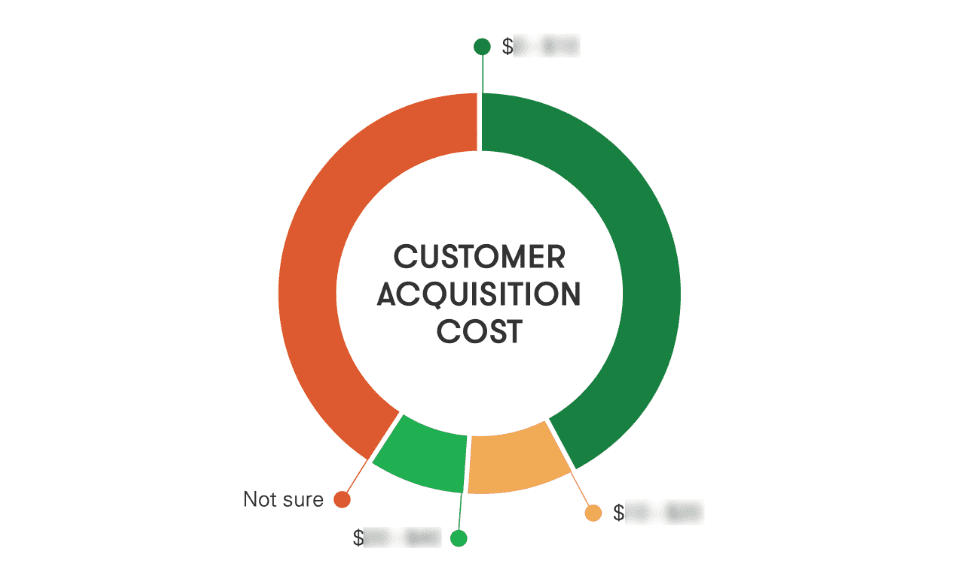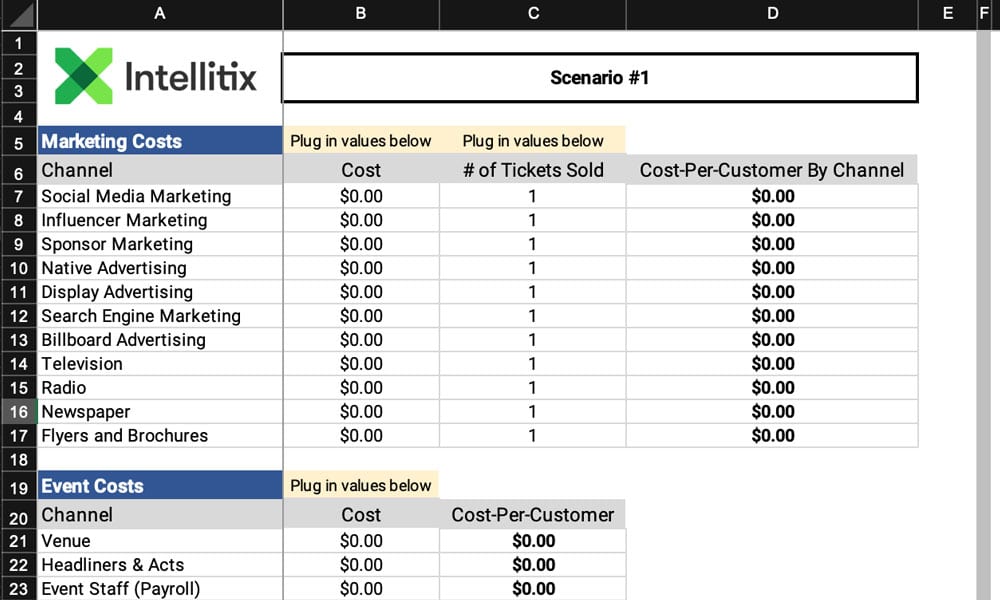Below, we’ll give you everything you need to calculate your customer acquisition costs, and how they impact your event.
But first, why does this calculation matter? A strange paradox plagues event marketers.
On one hand, you have a LOT of time to plan, analyze, and think about your event, and then face an unforgivingly short timeframe to actually execute on it.
But on the other hand…
All this time for analysis — a real luxury, coveted by marketers across every other industry — often ends up completely wasted.
This may be a bitter truth to swallow, but it’s hard to draw any other conclusion… The events industry has a reputation for poor data, and event marketers are notorious for failing to connect specific tactics to ROI.
In case you think the above claims may be exaggerated, our last survey revealed that 41% of event organizers have no idea what their customer acquisition costs are.

(Get full access to the data: grab our FREE report here.)
If this was a survey of digital marketers instead of event marketers, you’d soon see headlines about how the industry is in crisis.
So, you probably already know that you can do better.
But if you’re anything like other event organizers, you may have no idea where to start…
… do you now have to learn a whole lot of complicated math?
… spend hours wading through setting up confusing analytics?
… does this “doing better” thing mean you have to hire a data scientist?
No.
At least not if we can help it.
Below: we give you a free template that you can use right now to start calculating your customer acquisition costs, and see what brings the most bang for your buck!
But wait — before we get to that, let’s take a look at exactly why this matters so much, and why figuring out things like your cost per customer is so valuable.
Why You NEED To Track Your Event Financials, Starting Today
If you track absolutely nothing else about your event, track your financials. Specifically, calculate customer acquisition costs on a per-channel basis, as well as your all-in costs of the whole event.
Why are we so adamant, and what about all the other metrics?
Well, let’s put it this way: if your event is a car, then your event financials are the fuel.
You wouldn’t take a drive through the desert without thinking about exactly how much gas you have left, how far you need to go, and your chances of finding an unlikely fuel station somewhere along the way. You shouldn’t treat your event financials any other way.

(Don’t be this type of event marketer)
If you know how much you’re spending to acquire new fans, where you’re spending, and what your per-channel costs look like, you’re almost guaranteed to make better strategic choices when promoting your event next year. For example, knowing all of your combined costs lets you easily figure out what to charge for tickets to be profitable.
But just so we’re clear, there’s an even more important reason. This is the stuff that should really matter to you, but is rarely made explicit…:
If you don’t have proper financial metrics in place right now, implementing them will take you from “just another event organizer” to the go-to authority in your company.
Why?
Think about it this way:
Your CEO, your board, your stakeholders don’t want to hear you say things like “let’s spend more money on Facebook ads because that’s what the rest of the industry is doing, oh and also my gut says we should.”
The rest of the industry might be right, and maybe your gut feeling is infallible, but neither of those things make a convincing case.
Instead, your boss, your team, your different stakeholders all want to hear things like:
“Let’s spend more money on Facebook ads: when we get a new customer through Facebook, we pay Zuckerberg 30% less than when we get a new customer from other channels. Oh, and we should also cut our influencer marketing budget: even though we see a big surge in the number of ticket purchases when influencers promote us, the actual cost-per-customer means we’re just breaking even, if not outright losing money on this channel!”
Let’s take a look at what you need to get there (and why it’s not hard at all).
Your Event Customer Acquisition Cost Formula
The great thing about this formula is that it’s very simple, yet can be very powerful once you start applying it to different scenarios.
The Basic Formula:
The basic version reads:
Marketing Costs (MC), divided by Tickets Sold (TS), gives you the Customer Acquisition Cost (CAC)
MC / TS = CAC
The All-in Formula:
If you want to go beyond the basic formula, you can take a look at your event profitability as a whole. Here, you account not only for marketing but for all your operational costs. That means you add Event Costs (EC) to the marketing costs, and divide both of them by the number of tickets sold:
(MC + EC) / TS = CAC
Event costs differ widely on a case by case basis, but you will typically want to factor in things like venue cost, payroll, audiovisual equipment, and headliner fees.
Your Free Event Customer Acquisition Cost Calculator
The above formula is only your starting point.
Where things get really interesting is when you start comparing your customer acquisition costs throughout different channels, and modeling different scenarios.
To help you get started we put together a free template:

You can get the free template here.
You will have to either make a copy to your own drive (File → Make a Copy), or download it as a .xlsx file (File → Download → Microsoft Excel (.xlsx)).
To start using it, simply plug in the values for your different marketing costs, as well as the ticket sales associated with them. We formatted it for you so you can start by comparing two different scenarios, which will let you model different budget allocations.
3 Must-Have Tools to Always Know Exactly Where Your Ticket Sales Come From
If you open the template and immediately think “Wait! I have no idea how many tickets we sold because of social media ads vs. display ads,” then you will need to put proper data tracking tools in place.
Here are our top 3 recommendations.
1. Have a CRM
This is basic, but it’s crucial. When you don’t have a CRM (Customer Relationship Management) system in place, you seriously hinder your ability to gather good data about your event and your customers. It can be overwhelming trying to find a system that suits you well, so start by having a look at what’s well-reviewed on Capterra, or even with well-known free platforms like HubSpot. The latter may not be the ideal solution for events, but it’s a lot better than nothing.
2. Set up digital analytics tracking
If you’ve never worked with Google Analytics, if “UTM” sounds like an obscure company name to you, and if the word “pixel” makes you think of the latest phone, you may have to face a slight learning curve here. But the investment is going to pay back tenfold, because you will be able to clearly and quickly attribute ticket sales to specific channels. Great places to start include Google’s own Analytics Academy, or Facebook’s Blueprint.
3. Standardize (and insist on) naming conventions
This last one may seem somewhat broad, so here’s what we mean: any partner promotions, sponsors, external influencers, or even physical ads should be using a standard naming convention that helps identify channels. If a billboard advertises your event, it should point to a website or a link that is reserved specifically for billboard promotions. If an influencer promotes your event, again they should be sending people to a specific place, or distributing an influencer-specific code. An excellent place to start thinking about this is Funnel’s Blog about analytics.
All of the above should put you on the right path. And now that you know how to calculate your customer acquisition costs, you’re well on your way to making great strategic decisions about your event! And if you’re curious about the kind of data proper tracking can produce, check out the Intellitix State of Live report here.


